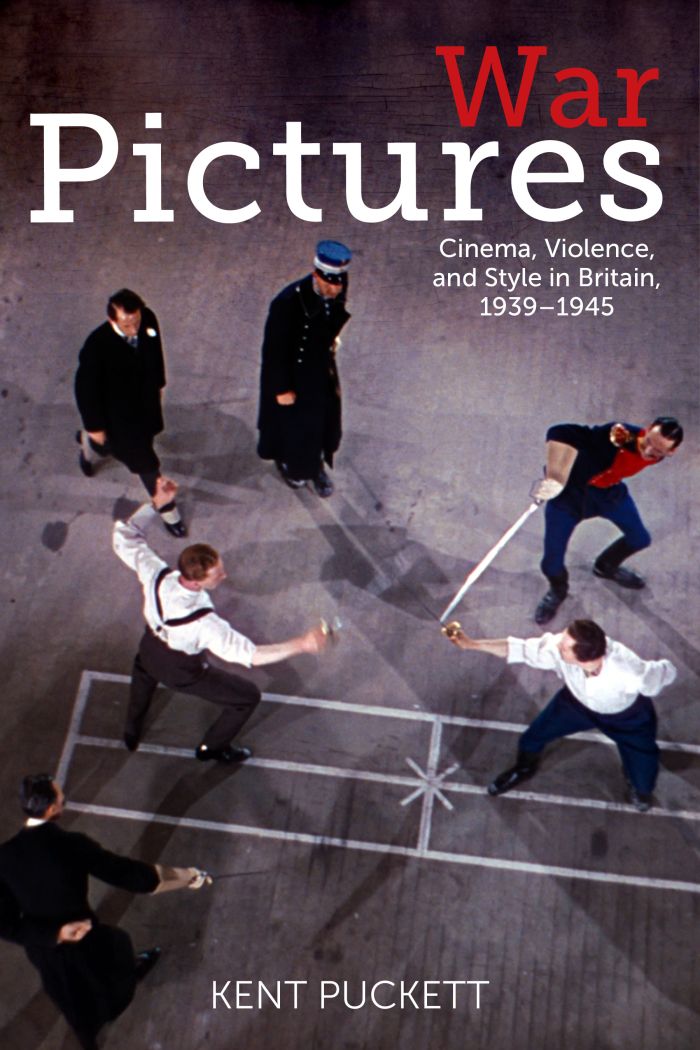War Pictures
Cinema, Violence, and Style in Britain, 1939-1945

This book can be opened with

In this original and engaging work, author Kent Puckett looks at how British filmmakers imagined, saw, and sought to represent its war during wartime through film. The Second World War posed unique representational challenges to Britain’s filmmakers. Because of its logistical enormity, the unprecedented scope of its destruction, its conceptual status as total, and the way it affected everyday life through aerial bombing, blackouts, rationing, and the demands of total mobilization, World War II created new, critical opportunities for cinematic representation.
Beginning with a close and critical analysis of Britain’s cultural scene, War Pictures examines where the historiography of war, the philosophy of violence, and aesthetics come together. Focusing on three films made in Britain during the second half of the Second World War—Michael Powell and Emeric Pressburger’s The Life and Death of Colonel Blimp (1943), Lawrence Olivier’s Henry V (1944), and David Lean’s Brief Encounter (1945)—Puckett treats these movies as objects of considerable historical interest but also as works that exploit the full resources of cinematic technique to engage with the idea, experience, and political complexity of war. By examining how cinema functioned as propaganda, criticism, and a form of self-analysis, War Pictures reveals how British filmmakers, writers, critics, and politicians understood the nature and consequence of total war as it related to ideas about freedom and security, national character, and the daunting persistence of human violence. While Powell and Pressburger, Olivier, and Lean developed deeply self-conscious wartime films, their specific and strategic use of cinematic eccentricity was an aesthetic response to broader contradictions that characterized the homefront in Britain between 1939 and 1945. This stylistic eccentricity shaped British thinking about war, violence, and commitment as well as both an answer to and an expression of a more general violence.
Although War Pictures focuses on a particularly intense moment in time, Puckett uses that particularity to make a larger argument about the pressure that war puts on aesthetic representation, past and present. Through cinema, Britain grappled with the paradoxical notion that, in order to preserve its character, it had not only to fight and to win but also to abandon exactly those old decencies, those “sporting-club rules,” that it sought also to protect.
“A welcome attempt to bring several mighty British films of the 1940s into contemporary relevance. Seizing on the eccentricity of three wartime movies—The Life and Times of Colonel Blimp, Henry V, and Brief Encounter—Puckett discloses the contrariety and oddity structuring these films' responses to war with an extraordinary intensity of focus.”——Alexander Nemerov, Stanford University
Seemingly as quirky in focus as are the eccentricities of British character 'strategically' enshrined in the three wartime classics under scrutiny, Puckett’s cultural inquiry is carried deep into what war can picture back to a society in crisis about its values and compromises. Across and beyond genres, with the apparatus of 'projection' (every sense) explored as one armature of resistance, Puckett takes us to places in the viewing experience rarely probed by screen analysis. Though he recognizes his work as film writing more than traditional film studies, in the long run his immersive approach delivers film thinking at its most challenging. In its canny battle against the predictable, War Pictures is a winning achievement.——Garrett Stewart, author of Closed Circuits: Screening Narrative Surveillance
War Pictures is an eloquent and absorbing study of some of the best known British movies of the Second World War. Describing a whole range of ways in which a work of film art can be about war, the readings are always stylish and often surprising—and Kent Puckett's Celia Johnson is completely unforgettable.——Marina Mackay, St. Peter's College
Please click the link below to download the Open Access version of this book.
- War Pictures - epub

